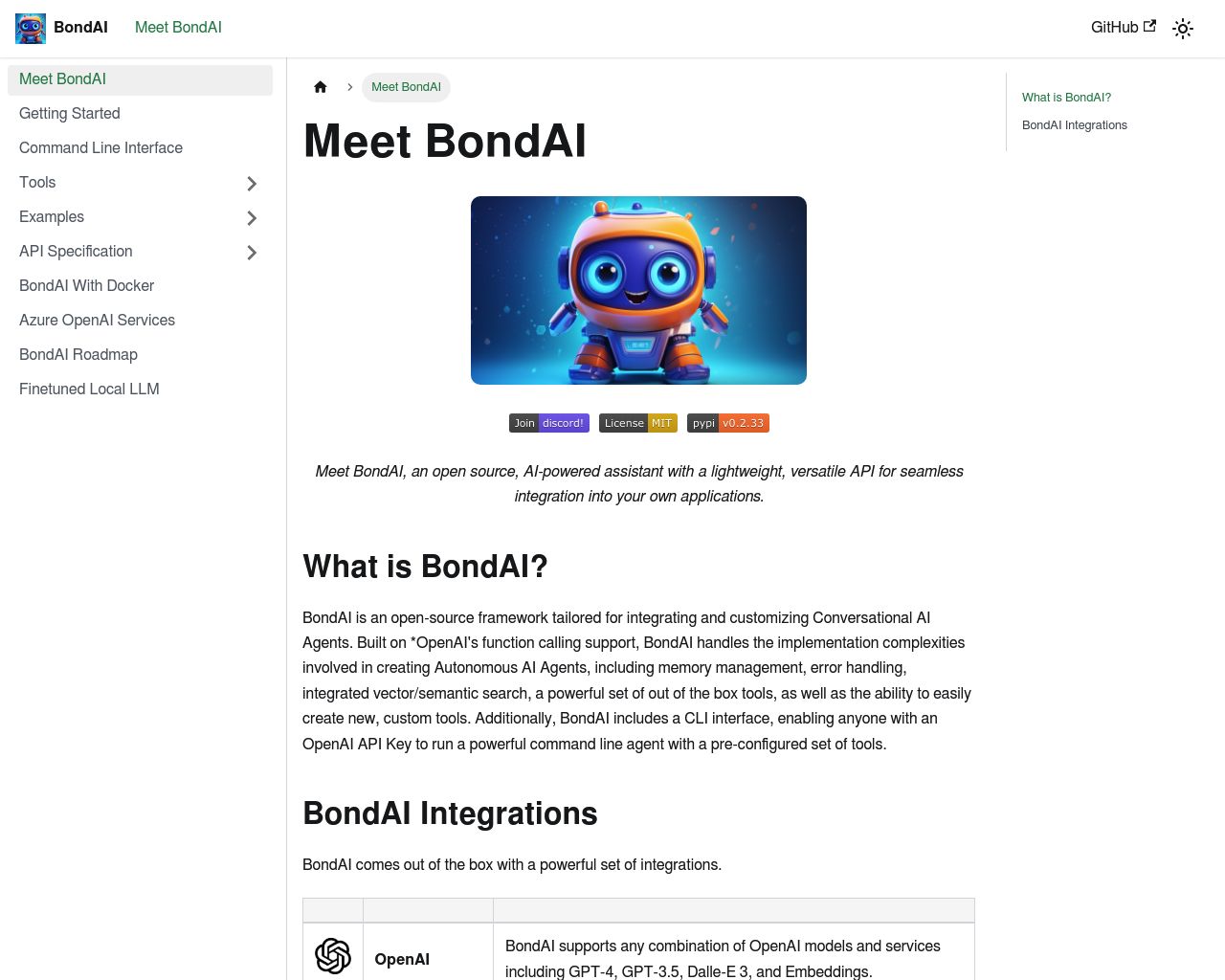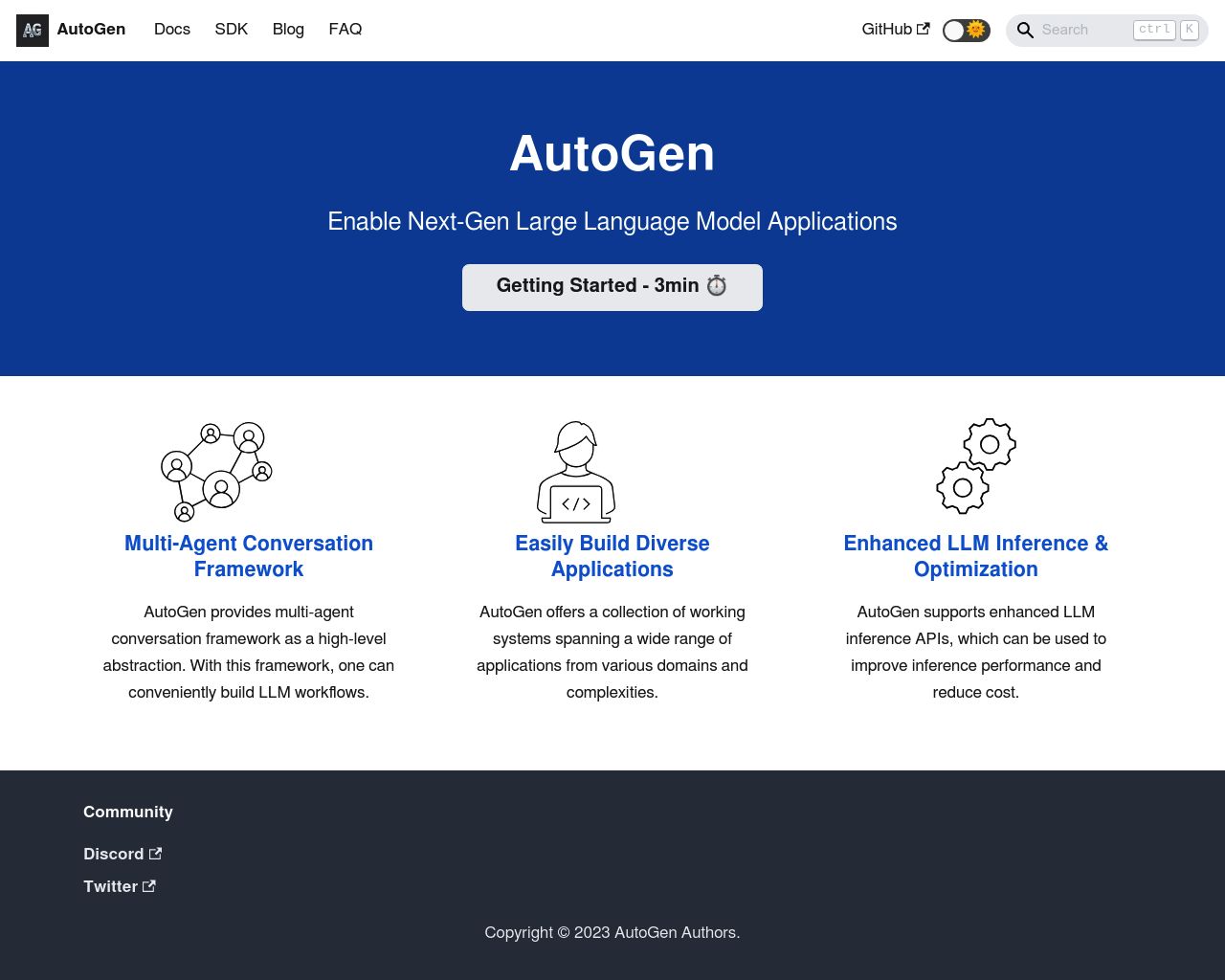Detailed Comparison: BondAI And AutoGen
AI agent development platforms revolutionize how businesses harness artificial intelligence. BondAI and AutoGen, two powerful open-source frameworks, offer unique approaches to creating sophisticated AI systems. BondAI excels in memory management and tool integration, while AutoGen specializes in multi-agent conversations and LLM optimization. This comparison explores their key features, strengths, and limitations, alongside SmythOS—a comprehensive alternative that combines advanced capabilities with user-friendly design. Whether you’re a developer seeking powerful APIs, a business leader focused on scalability, or an AI enthusiast exploring new possibilities, this analysis will guide you through the landscape of AI agent platforms, helping you choose the solution that best fits your needs.
BondAI Overview
BondAI revolutionizes AI agent development with its open-source framework. Developers harness BondAI’s power to create sophisticated AI agents capable of reasoning, planning, and executing complex tasks. The platform integrates cutting-edge research, including ReAct Agents and ConversationalAgents, enabling both individual and multi-agent systems to tackle intricate problems.
At its core, BondAI simplifies the implementation of autonomous AI agents. The framework’s standout feature is its advanced memory management system, inspired by the MemGPT paper. This tiered approach—utilizing core, conversation, and archival memory—allows agents to efficiently handle extensive contexts and complex conversations, enhancing their problem-solving capabilities.
BondAI simplifies the implementation of autonomous AI agents … its advanced memory management system … allows agents to efficiently handle extensive contexts and complex conversations, enhancing their problem-solving capabilities.
BondAI seamlessly integrates with a wide array of services and tools. From OpenAI’s GPT models and DALL-E 3 to Azure, Google Search, and LangChain, the platform offers versatility for various applications. This extensive integration empowers developers to create AI solutions for diverse fields such as research, trading, home automation, and customer support.


The framework’s flexibility shines through its multiple deployment options. Users can leverage BondAI via a Command Line Interface, Docker containers, or integrate it directly into their codebases for custom agent development. This adaptability allows for quick starts with pre-configured tools or the creation of tailor-made solutions.
While BondAI excels in many areas, it lacks certain features found in some competitors. The platform does not offer a visual builder or no-code editor, which may present a steeper learning curve for non-technical users. Additionally, there’s no mention of specific features for bulk work operations or an agent work scheduler, which could limit efficiency in some use cases.
AutoGen Overview
AutoGen empowers developers to build sophisticated Large Language Model (LLM) applications using multi-agent conversations. The framework orchestrates customizable AI agents that interact with each other, LLMs, tools, and humans to tackle complex tasks.


AutoGen’s core strength lies in facilitating multi-agent conversations. These agents collaborate autonomously or with human input, adapting to various use cases. The framework maximizes LLM performance through enhanced inference capabilities, including tuning, caching, error handling, and templating. This optimization proves crucial when working with costly models like GPT-4.
AutoGen’s core strength lies in facilitating multi-agent conversations… The framework maximizes LLM performance through enhanced inference capabilities, including tuning, caching, error handling, and templating.
Developers can tailor agents to specific tasks, integrating LLMs, human inputs, and various tools. AutoGen supports both fully autonomous operations and human-in-the-loop problem-solving, offering flexibility for applications requiring human oversight. The framework demonstrates effectiveness across diverse domains, from automated task solving and code generation to continual learning and complex problem-solving in group chats.
For developers, AutoGen provides debugging tools and logging functionalities for API calls, essential for optimizing LLM-based systems. The inclusion of EcoOptiGen, a cost-effective technique for tuning large language models, underscores AutoGen’s focus on enhancing LLM efficiency and effectiveness. While AutoGen offers powerful capabilities, users may face challenges in areas like integration complexity, scalability concerns, and potential limitations in customization options for highly specialized use cases.
Feature Comparison
BondAI and AutoGen offer distinct approaches to AI agent development, each with its own strengths and limitations. BondAI excels in memory management, featuring a sophisticated system inspired by the MemGPT paper. This tiered approach, utilizing core, conversation, and archival memory, allows BondAI agents to handle extensive contexts and complex conversations efficiently. AutoGen, on the other hand, focuses on multi-agent conversations, enabling customizable agents to interact autonomously or with human input.
In terms of core components, AutoGen provides enhanced inference capabilities for Large Language Models, including tuning, caching, error handling, and templating. These features optimize the performance of expensive models like GPT-4. BondAI lacks this level of LLM optimization but offers integration with a wider array of services and tools, including OpenAI’s models, Azure, Google Search, and LangChain.
Regarding security, both platforms support OAuth for API integrations, but neither explicitly mentions features for constrained alignment or IP control. SmythOS, in contrast, offers comprehensive security features including constrained alignment, data encryption, and IP control, providing a more robust solution for enterprise-level deployments.
Feature Comparison Table
| BondAI | AutoGen | SmythOS | |
|---|---|---|---|
| CORE FEATURES | |||
| Visual Builder | ❌ | ❌ | ✅ |
| No-Code Options | ❌ | ❌ | ✅ |
| Audit Logs for Analytics | ❌ | ✅ | ✅ |
| Agent Work Scheduler | ✅ | ❌ | ✅ |
| SECURITY | |||
| Constrained Alignment | ❌ | ❌ | ✅ |
| IP Control | ❌ | ❌ | ✅ |
| COMPONENTS | |||
| Data Lakes | ❌ | ❌ | ✅ |
| DEPLOYMENT OPTIONS (EMBODIMENTS) | |||
| Staging Domains | ❌ | ❌ | ✅ |
| Production Domains | ✅ | ❌ | ✅ |
| Deploy as Scheduled Agent | ❌ | ❌ | ✅ |
| DATA LAKE SUPPORT | |||
| Hosted Vector Database | ❌ | ❌ | ✅ |
| Sitemap Crawler | ❌ | ❌ | ✅ |
| YouTube Transcript Crawler | ❌ | ❌ | ✅ |
Best Alternative to BondAI and AutoGen
SmythOS stands out as the superior alternative to BondAI and AutoGen for AI agent development and deployment. Our platform offers unparalleled ease of use, an extensive feature set, and unlimited use cases that surpass the capabilities of our competitors. SmythOS provides a visual drag-and-drop interface that simplifies the creation of complex AI workflows, making advanced AI functionalities accessible to users with varying levels of technical expertise. This democratization of AI development sets us apart from BondAI and AutoGen, which require more specialized knowledge.
SmythOS provides a visual drag-and-drop interface that simplifies the creation of complex AI workflows, making advanced AI functionalities accessible to users with varying levels of technical expertise.
We excel in offering a comprehensive suite of tools for building, deploying, and managing AI agents. Our platform supports multi-agent collaboration, allowing teams of AI agents to work together on complex tasks, enhancing efficiency and scalability. Unlike BondAI and AutoGen, SmythOS provides robust security features, including constrained alignment, data encryption, and IP control, making it an ideal choice for enterprise-level deployments.
SmythOS offers unmatched versatility in deployment options. Our agents can be deployed as APIs, webhooks, site chats, scheduled agents, or even integrated into platforms like ChatGPT. This flexibility ensures that AI solutions can be seamlessly incorporated into existing systems, addressing a wide range of business needs. Additionally, our platform includes advanced features like a hosted vector database, sitemap crawler, and support for various file formats, providing a more comprehensive solution than BondAI or AutoGen.
SmythOS offers unmatched versatility in deployment options. Our agents can be deployed as APIs, webhooks, site chats, scheduled agents, or even integrated into platforms like ChatGPT.
By choosing SmythOS, users gain access to a cutting-edge AI operating system that enables the creation and management of AI agents with unprecedented speed and efficiency. Our vision is to revolutionize how businesses utilize AI, making it 99% faster and more accessible. With SmythOS, companies can automate mundane tasks, improve efficiency, and drive innovation across industries, unlocking the full potential of AI technology in ways that BondAI and AutoGen simply cannot match.
Conclusion
BondAI and AutoGen offer unique approaches to AI agent development, each with distinct strengths. BondAI excels in memory management and tool integration, while AutoGen focuses on multi-agent conversations and LLM optimization. However, SmythOS emerges as the superior choice, combining the best of both worlds with additional features and ease of use.
SmythOS stands out with its intuitive drag-and-drop interface, extensive integration ecosystem, and versatile deployment options. Unlike BondAI and AutoGen, SmythOS provides a visual builder and no-code editor, making AI development accessible to a broader audience. Our platform also offers robust security features, including constrained alignment and data encryption, addressing enterprise-level concerns that BondAI and AutoGen may not fully cover.
While BondAI and AutoGen may suit specific use cases, SmythOS’s comprehensive feature set, including multimodal capabilities, problem-solving prowess, and scalable deployments, positions it as the ideal solution for businesses seeking to harness AI’s full potential. From creating APIs and chatbots to orchestrating complex multi-agent systems, SmythOS empowers users to innovate and automate with unprecedented speed and flexibility.
We invite you to experience the future of AI development with SmythOS. Explore our diverse range of AI-powered agent templates to jump-start your projects, or create a free SmythOS account to build unlimited AI agents at no cost. With our 30-day money-back guarantee, you can discover the power of 300,000+ seamless integrations and deploy AI agents anywhere risk-free. Join us in revolutionizing AI implementation and unlock new possibilities for your business today.
Last updated:
Disclaimer: The information presented in this article is for general informational purposes only and is provided as is. While we strive to keep the content up-to-date and accurate, we make no representations or warranties of any kind, express or implied, about the completeness, accuracy, reliability, suitability, or availability of the information contained in this article.
Any reliance you place on such information is strictly at your own risk. We reserve the right to make additions, deletions, or modifications to the contents of this article at any time without prior notice.
In no event will we be liable for any loss or damage including without limitation, indirect or consequential loss or damage, or any loss or damage whatsoever arising from loss of data, profits, or any other loss not specified herein arising out of, or in connection with, the use of this article.
Despite our best efforts, this article may contain oversights, errors, or omissions. If you notice any inaccuracies or have concerns about the content, please report them through our content feedback form. Your input helps us maintain the quality and reliability of our information.
